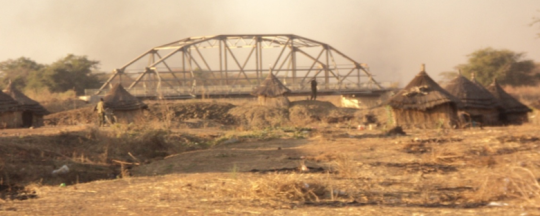A key figure in Darfur’s largest Arab tribe announced today that the tribe intends to enter the borderland Samaha region before negotiations between Khartoum and Juba can resume in Addis Ababa. This position further complicates the negotiations over security arrangements.
Tension over the disputed area flared when the African Union mediator Thabo Mbeki apparently put the area south of the security line he proposed as the basis for a 10-kilometre buffer zone between the Sudanese and South Sudanese militaries.
Mahmoud Musa Madibo, a top Rizeigat tribal leader, said that the tribe would not tolerate negotiations over the Samaha region. “There is nothing to dispute about Samaha; it was not part of the Naivasha Agreement,” he said referring to the North-South peace deal of 2005 which eventually led to South Sudan’s independence.
Samaha is a village and market about 2 kilometres north of the Kiir Adem Bridge over the Bahr El Arab River. Both Arab traders and South Sudanese troops (SPLA) are present in the village but in most other parts of that corridor the Southern army only reaches as far north as the river. The Rizeigat claim extends to grazing lands south of the river where herders have occasionally clashed with the SPLA soldiers.
The Rizeigat leader told Radio Tamazuj today that the tribe has documents to prove that Samaha is part of Sudan under the administration of East Darfur State. He also explicitly threatened to take the area by force. It is not clear whether he was referring only to Samaha village or more widely to the entire Rizeigat-claimed area.
“There is no negotiation over Samaha and it is not part of the negotiations. The South included it as their own and we have our own plans as well. If everything is to be done by force, we are not weak,” said Madibo, who serves as deputy (wakeel nazir) to the paramount chief of the Rizeigat.
Madibo’s remarks signal tribal backing for Khartoum’s position on the disputed border just days before the resumption of talks with South Sudan. The threat, if acted on, could bring Rizeigat fighters into conflict with troops of the SPLA 3rd Division.
On the other hand, another leading Rizeigat figure rejected this position and advocated a less militant approach. Abdel Hamid Musa Kasha, the former governor of South Darfur, in an interview with Radio Tamazuj today disagreed with Madibo on the issue and ruled out the possibility of his tribe being pulled into a war.
Kasha stated that the border was the responsibility of the nation: “Our brothers in Sudan and south Sudan are now negotiating over disputed border regions that were not part of the Naivasha Agreement. The border is the responsibility of the state, not the responsibility of tribes. It is the responsibility of the nation, the responsibility of the entire community (umma), responsibility of the security, responsibility of foreign policy. Really, it is the responsibility of the government. There are systems that handle these issues.”
Meanwhile, international mediators have sought to clarify that they propose only a temporary security line rather than a permanent border agreement. Sudan has rejected these reassurances. Hassabo Mohamed Abdel Rahman, political secretary of the ruling National Congress Party, announced that the government will liberate Samaha before the next round of negotiations.
Hassabo asserted that Sudan would not give up on an inch its territory and called on South Sudan to withdraw its troops from all the territories that lie within Sudan’s borders. The top NCP official also serves as minister for decentralization in the president’s cabinet.
Mbeki’s mediation team has called the disputed region ‘Mile 14’ because British administrators in 1924 delimited the Rizeigat dar (tribal homeland) at 14 miles south of the River Kiir/Bahr El Arab. This decision came to be known as the Munro-Wheatley Agreement. Ever since, the border has appeared on maps according to this line rather than the river.
Related content:
No confirmation of Warguet attacks, violation of South Sudan border (25 May 2012)




